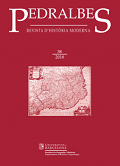Cooperación y competencia políticoeconómica en la larga duración: Holanda en la ruta del Mediterráneo (1621-1702).
DOI:
https://doi.org/10.1344/pedralbes2018.38.1Keywords:
Dutch Republic, Hispanic Monarchy, Straatvaart, Mediterranean sea, early modern periodAbstract
Long-term political-economic competition and cooperation: the Dutch on the Mediterranean route (1621-1702)
From the 1610s onwards the economic and political evolution of the Mediterranean strongly depended on the activity of transporters from northern Europe, who vied with others in a space characterized by competition and une-qual exchange between native towns of diverse socio-religious characteristics.
That space was disturbed on many occasions by war, epidemics and privateering, resulting in a historiographical perception of decadence and continuous crisis. The political events that marked the relations of the Hispanic Monarchy and the new Republic of the United Provinces influenced, however, the development of a maritime and commercial relationship that linked important market areas and economic spaces. This article presents a general outline of Dutch participation in this space through what they called the Straatvaart route (navigation of the Strait of Gibraltar). I will focus on the characteristics of this long-lasting phenomenon, dwelling on the political-military events that marked its destiny and the relationship of the Republic of the United Provinces with the Hispanic Monarchy.
Downloads
Published
How to Cite
Issue
Section
License
Copyright (c) 2018 Ana Crespo Solana

This work is licensed under a Creative Commons Attribution-ShareAlike 4.0 International License.
Authors must agree with the following terms:
1. The author keeps authorship rights, ceding the journal the right to first publication.
2. Texts will be disseminated with a Creative Commons Attribution 4.0 International License. Which allows for the work to be shared with third parties, as long as they recognise the work’s authorship, the original publication in the journal and licensing conditions.
This requires acknowledging authorship appropriately, providing a link to the license, and indicating if any changes have been made. It can be indicated in any reasonable way, but not in a manner that suggests the licensor endorses or sponsors the use of the text.
If content is remixed, transformed, or new content is created from the journal's texts, it must be distributed under the same license as the original text



